LAST UPDATE | 4 Jun 2020
This article is a part of Genius Week, a series of features reflecting on sporting genius in its many different forms.
Below, Fintan O'Toole takes a closer look at Maurice Fitzgerald's star display in the 1997 final as he won his first All-Ireland medal.
__________
ON THE WEEK leading up to the 1997 All-Ireland final, Maurice Fitzgerald set off from Renard Point and rowed his boat out towards Beagnish Island.
He stopped off there on a break from a solo fishing trip to catch up with the Casey brothers, both in their 90s and lifelong residents of an island that they were the only two remaining inhabitants of.
It was a chance for escapism off the south Kerry coast, leaving behind the mainland where hysteria was rising ahead of the bid to bring Sam Maguire back to the Kingdom after an 11-year absence.
"I have never seen so many flags and buntings out," remarked Ned Fitzgerald, Maurice's father, to Tom O'Riordan in the Irish Independent that week.
"It's like Corpus Christi with people dressing their windows and all that is missing are the holy pictures and statues."
Ned had played for Kerry in the 1950s. He was involved in the squad that won in '55 but missed out on a medal as the seventh sub, captained the team that crashed to a shock loss to Waterford in '57 and through his friendship with Valentia's Mick O'Connell had become closely acquainted with a football icon.
His son burst onto the senior scene in a dazzling fashion as he kicked ten points in the 1988 Munster final. Kerry lost by one to Cork. It was Maurice's misfortune for the start of his career to intersect with his county's slide from greatness and the rise of their provincial neighbours.
That debut season culminated in an All-Star award but Kerry only emerged from Munster twice after that - 1991 and 1996 - until their progress in 1997. That was the backdrop to that showpiece against Mayo. It had taken Fitzgerald ten campaigns before the chance arose to run out at Croke Park in September.
"You got the sense that the one thing he was deadly serious about was the football because everything else was a big joke to him," recalls Dara Ó Cinnéide.
"You'd very rarely have a serious conversation with Maurice. He'd be laughing about eating cones and chocolate buns after training, and not doing anything an inter-county player should be doing. But he was as tough as nails despite the way he looked and played. You saw the beauty and the grace but there was genuine hardness to him mentally.
"In '97 he'd about 13 months solid training, he trained hard that winter. It was the one year he trained consistently without injury."
"Off the field he was a quick-witted, roguish kind of character," remembers Killian Burns.
"Having the craic with the lads but then when it came to gameday, he wouldn't be afraid to say a few words before the match to remind us of what he'd been through. I just liked his vibe on the pitch, he was always very positive. He didn't get gritty that much but when he did, you listened."
After the golden years came the fall. Mick O'Dwyer's sides relentlessly collected trophies, teamsheets festooned with legendary names as they enshrined Kerry's football reputation. In the era of wilderness that followed they county found themselves under the rule of Cork. They had to watch on as Clare celebrated wildly in '92. On a couple of occasions they managed to engineer a route to the All-Ireland semi-final but Down in '91 and Mayo in '96 sent them packing.
As the years rolled on Fitzgerald became a lightning rod for local discontent.
"From my age of 13 in '88 to 18 in '93 when I got to know Maurice first, you could see the love from the terrace drifting a small bit because Kerry weren't good," says Ó Cinnéide.
"He was revered in '88 but as Kerry got more criticism, Maurice tended to get more criticism. I'd say those years were tough for him.
"I remember genuine people doubting his ability. He hadn't really done it on the massive stage because we hadn't played on the bigger stages, it was always just in Munster."
Within the setup they didn't need to be reminded of his value. Ó Cinnéide made his debut in February '94 on a heavy pitch in Ballina, the drudgery of the league fare illuminated by an audacious chip to the net by Fitzgerald. Burns grew up in Sneem and in their southern football territory, the star from Cahersiveen was a figure that was worshipped.
"From my point of view as a teenager, he was this kind of shining light of positivity amidst all the negativity that Kerry were going nowhere.
"He was a superstar, a fella you looked to when you were going to matches. When I got to the stage where I was able to play South Kerry football, I was playing with Maurice Fitzgerald and that was amazing to do."
Fitzgerald hit the heights early in 1997 and his form never dipped. Chief architect in their National League victory, 0-7 against Tipperary, 0-5 in the Munster final win over Clare and he hit 0-7 when facing Cavan, as well as threading through a pass for the Mike Frank Russell goal that sealed the passage to the All-Ireland final.
That was on the main stage and on the training ground there were nightly advertisements of his talent. Burns regularly found himself policing the St Mary's man during in-house games.
"His jinks were unbelievable, he'd send you one direction going for a ball. He reminded me of Colin Corkery. I marked him in a Munster semi-final in Killarney in 2000. When he got the ball, there was about a metre and a half between the back of his arse and the top of his foot, and it was just impossible for the likes of me to reach him.
"And Maurice had that because he was such a big frame of a fella. It was almost impossible to get your hands on the ball when he had won it. Not great for a fella 19 or 20 coming into games, playing back and forwards, and he scoring three or four goals on you, left and right."
"Mici Ó Conchúir is probably one of the best backs that ever played with our club," outlines Ó Cinnéide.
"Captain when we won the county championship in 2001. His nickname was Sticky Mici. You just couldn't shake him off. Mici won an All-Ireland junior with Kerry around '97 and Páidí brought him in for a trial, A versus B, coming up towards the All-Ireland. Mici came up to me and Darragh Ó Sé at half-time in that game, he wasn't marking Maurice, he was on Hassett I think, but Maurice was making Hassett look so good that Mici was looking terrible. He said to us that now he knew what we'd been talking about with Maurice.
"The dummies, the no look passes, it was just ridiculous. Training ground heroes are almost a cliche, I'm glad a lot of that came out on the bigger stage."
On 28 September 1997 Fitzgerald at last was a main player on All-Ireland final day. His presence was a subplot to the wider discussion on Kerry's pursuit of honours. A pair of U21 successes in '95 and '96 had forged a close bond between the youthful group and Páidí Ó Sé, that was reinforced when they all graduated together to the senior ranks and their manager successfully insulated the players inside from the public clamour outside.
"Páidí's personality, I won't say it overshadowed, but he drew the press like flies," says Ó Cinnéide.
"They were fascinated by his antics on the sideline. He was such a colourful character, that took a bit of pressure off Maurice as well in a way. There was that sense at times we might never win an All-Ireland. But I'd give Páidí serious credit, he never doubted himself and he never that pressure on us as a group. He was very good at turning hurt around and after Mayo '96, he was able to get a year's capital out of that."
Burns didn't feel their attacking talisman was in danger of being suffocated by the pressure either.
"We listened to Páidí and he told us what to do. As young lads history doesn't really bother you. And if Maurice felt pressure, he didn't show it. He'd a very lazy, languid style of football but it hides a massive grit when it comes to football which is his passion. Off the field he's relaxed and chilled. Even on the morning of big matches, I never saw him show anything that suggested he felt stressed or out of control. He'd have a quiet word with you and was very much a father figure type person."
The game began in a tenative fashion, Kerry and Mayo renewing acquaintances after John Maughan's team had swept home with six points to spare the year previous. Fitzgerald's most notable involvement early on was in that freakish passage of play which saw his team-mate Billy O'Shea end up stricken on the turf after breaking his leg.
Ó Cinnéide is able to set the record straight on one anecdote conjured from the incident.
"The old urban myth got thrown out post match that Billy said to Maurice, 'Win it for me'. That conversation never happened because I was right near them at the time and I think Billy knocked that on the head afterwards
Fitzgerald was not unnerved by it. Soon after he would nonchalantly stroke over a point from the ground with his left foot into the Canal End, a perfect illustration of his supreme kicking ability.
"My late uncle and my first cousin were actually right behind him, I remember my mother saying they were on television," recalls Ó Cinnéide.
"Like the biggest day of his life, he was leaning against the wire relaxed before taking a kick like he was below in Con Keating Park.
"I would have looked at him taking frees and the one thing I would have learned from him is to relax, don't tense up, just an easy swing. Maurice was equally good off either foot, it didn't matter. I would have done it at club level but you wouldn't have the balls to do it at inter-county level."
That was the start of it. By half-time Kerry were protecting their 0-8 to 0-3 advantage, by full-time they were 0-13 to 1-7 clear. Fitzgerald had supplied nine points, five frees and four from play, as he paraded his football gifts.
"Fitzy, he's the kind of fella, if you started to rile him or tried to knock him about a little bit, he'd up his game to prove a point," says Burns.
"Never in a showman type of way. Looking at the Michael Jordan series where lads were putting it up to him and he just brought it on to another level and I think Fitzy was kind of like that. Every now and then he did need a little rocket under his arse to get going. It was a cruel twist of fate for Billy O'Shea to break his leg, that was maybe the trigger for Maurice to turn on the show.
"To do it in an All-Ireland final that you've never reached before and you haven't won one in 11 years and after breaking a fella's leg, I mean it doesn't get more dramatic than that.
"Maurice scored a rake of points but I did feel it was a 15-man effort. I think he'd be the first to admit that. He was getting those balls to give himself that space where it became one on one and he was able to do then what he does best."
In the sorrowful tales of Mayo football, their problems in stifling Fitzgerald was an addition to a list that would continue to grow. Their defensive strategy was a surprise to Ó Cinnéide and his attacking team-mates.
"In the final I was full and he was corner. Traditionally if you were picked 14, you marked three in those years. That time I was supposed to be marking Pat Holmes and Maurice to this day I don't know why they didn't put Kenneth Mortimer on him, because he was their best defender.
"He was an All-Star the previous year and absolutely cleaned me out in '96. Pat Holmes wasn't a bad defender to be fair to him but Mortimer was their go-to man-marker."
Mayo did rally in the second half but Kerry would not be overtaken and Fitzgerald crowned the day with a late kick from under the Cusack Stand, a right-foot shot that travelled towards Hill 16.
"I was whipped ashore at that stage," laughs Ó Cinnéide.
"I was stinking the place out, I was on the sideline with the subs. Again no more than the kick in 2001 in Thurles, and I'm not saying it in hindsight, at the time we knew he had that kick, from training. It was a routine kick for Maurice, it wasn't for anybody else."
Any whispers of doubt over Fitzgerald evaporated over the course of that game. Burns can recall him being feted in the aftermath, man-of-the-match in the final, a third All-Star award and Footballer of the Year. They went to New York in October to mark the 50th anniversary of the Polo Grounds final and Fitzgerald lit up Downing Stadium on Randall's Island by ransacking the Cavan defence for 1-10. It all helped create an indelible impression he made on his forward compatriot from An Ghaeltacht.
"He scored 1-10 and I'd say half his team-mates were hungover that day. Maurice was well able to have the craic but he just had that mystique about him. Maurice didn't go out to the bars with us after games like most of us did, he did his own thing. He was a married man in '97, we were all bachelors.
"It was a privilege really to play in the same team as him. It's all a snapshot of time. It's how you felt at the time and he just made you feel good about the game.
"We're getting a lot of memory lane stuff these days. Every conversation I have and people are laughing at me at this stage, even with the 70s and 80s team, I'd always say Maurice is the man. It's a spurious enough conversation I know but Maurice was my favourite footballer. I'm in awe of the man and I played with him."
Maurice, gan cheist. Seacht lá na seachtaine.
— Dara Ó Cinnéide (@ediennico) April 18, 2020
'97 proved to be Fitzgerald's peak as a player on All-Ireland final day. He finished his career with another unwanted tag as a super sub but Burns saw his commitment to the sport never waver with his playing exploits for the South Kerry division, the displays of coaching acumen with St Mary's and his work as a selector with Kerry.
"For Maurice it must have been a massive release valve I imagine. He had given his whole life to it and gave many more years after it. I only had six or seven years playing football with Kerry, and I admire the lads that are there 15 years. Giving that type of sacrifice to anything in your life which doesn't always give you reward, I would always admire those people.
"Maurice is a lifer, he's back involved in the game and he never left it really. With South Kerry, we won three county championships, he was performing out of his skin. He's one of my definite heroes in GAA, not just on the pitch, he's the embodiment of Kerry football."
Fitzgerald had to wait for the acclaim.
But he got it all and more in the end.
First published today at 06.30







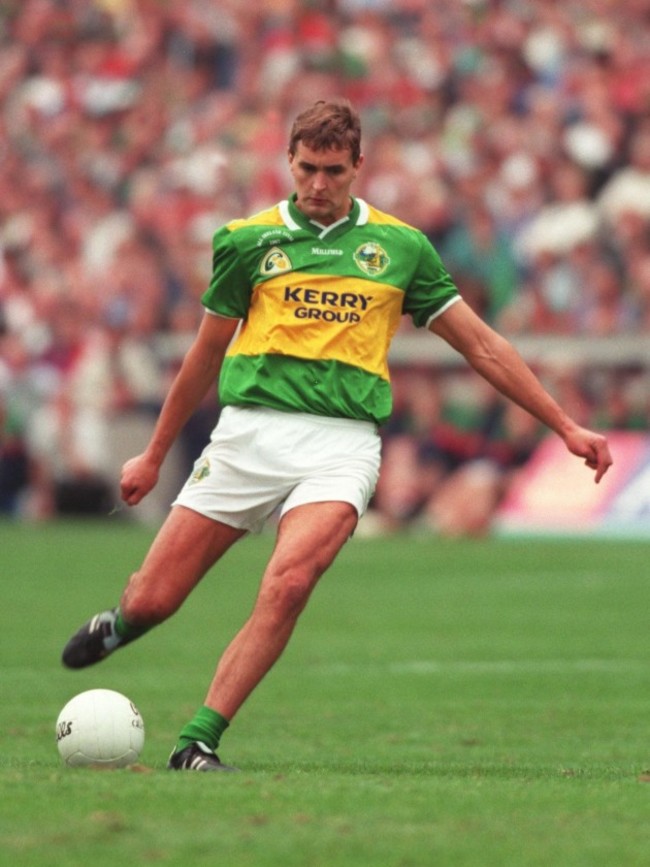
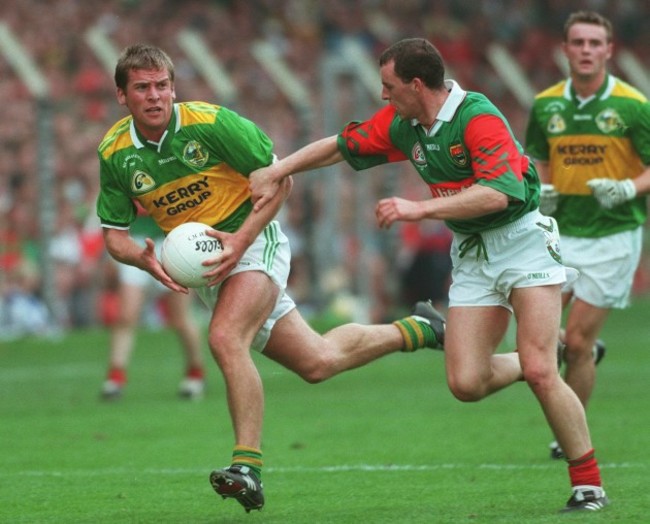
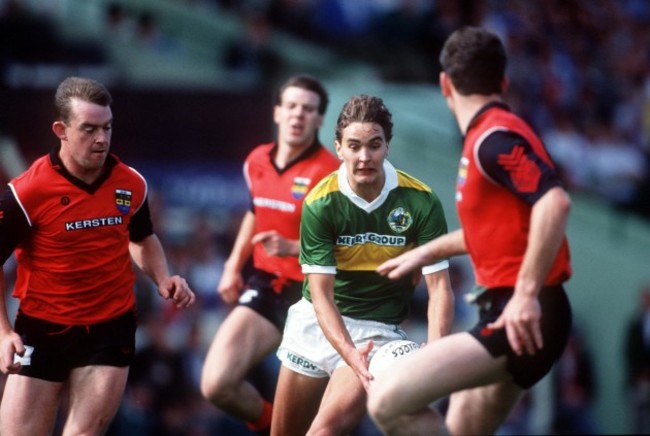
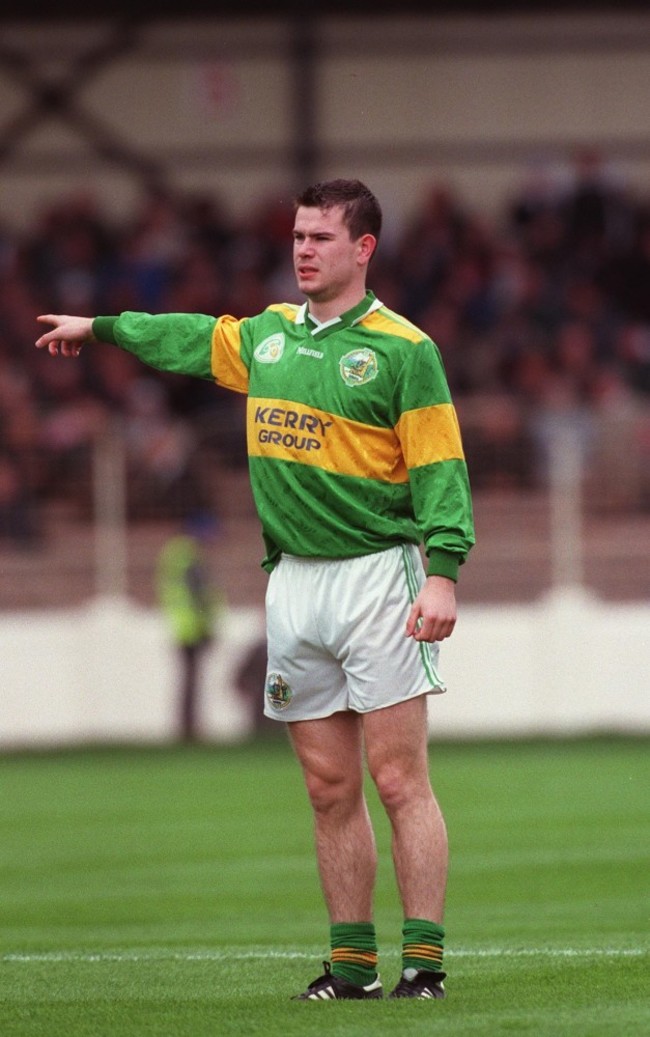
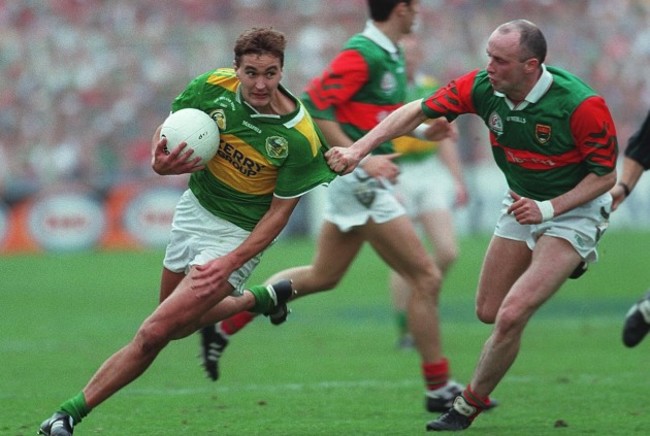



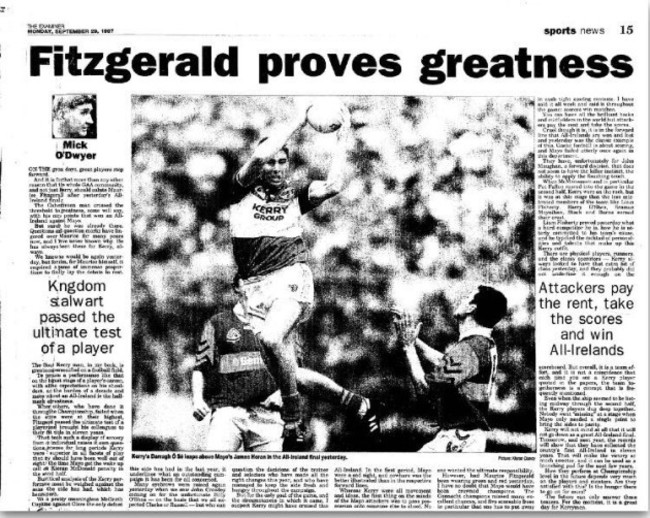
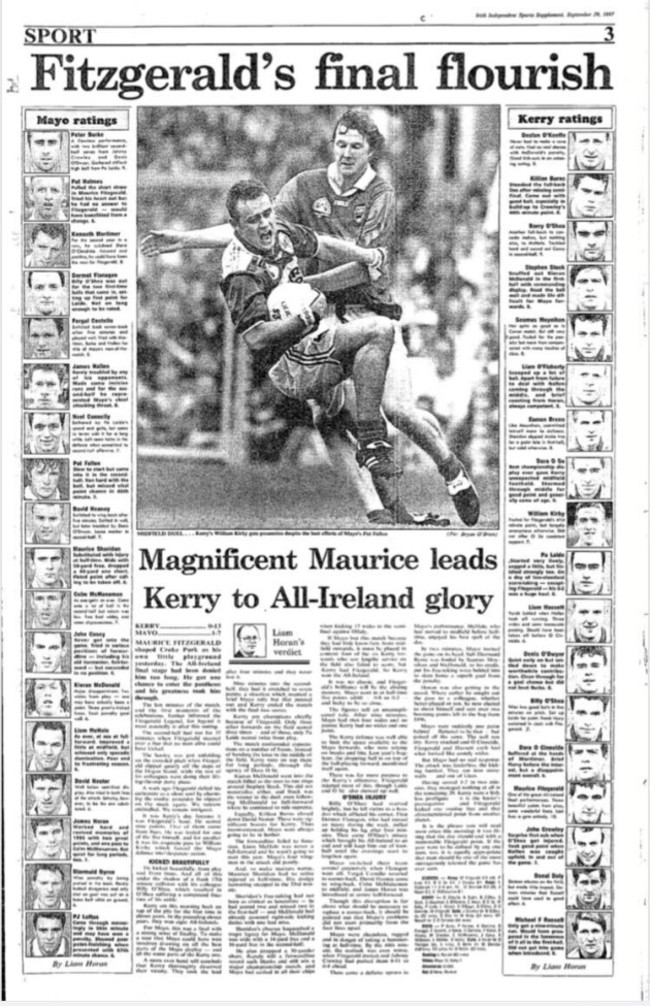
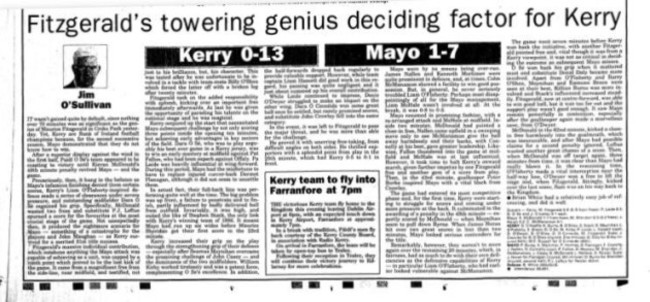
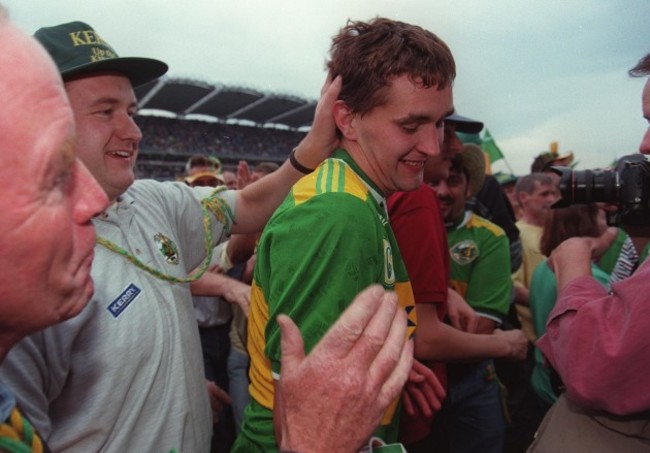

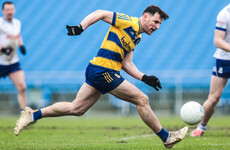


Maurice Fitz was one of the greatest players I’ve ever seen. I will however never forgive him for the point he scored against Dublin from the sideline. It was pure class
@my name: That score along with Ciaran McDonalds winning point for Mayo in 2006 against us are up there with the best points I have ever seen. But both were heartbreaking as a Dub
@Macker: throw in mugsys goal against yous as well. Big players love playing the dubs
@my name: There was a wonderful radio advertisement for something – maybe a particular newspaper’s sports coverage – which used this MF point as its centerpiece. I could never find it again, but it focused on Maurice as he walked along to take the free,and how he bent down for advice from Paudie for advice on this ‘seemingly impossible’ shot, only to be told, “Yerra, shtick it over the bar!”
Best player I’ve seen. Had an elegance about him, great balance, natural ability, all the skill in the world and a cool head. He was worth the entrance fee alone.
@Brian Dunne: Im with you Brian. I had the pleasure of watching some of the greats, but Maurice is always my first choice. He just made it all look so easy.
Absolutely brilliant player & would have been more acclaimed if he had played with better kerry teams in the early years. Can you imagine if he was around for the kerry golden years or the 2000 teams that came after he retired from inter county football. To see someone kicking frees off the ground with both feet in an all Ireland final is Roy of the rovers stuff, the man was a genius. Like Seamus Moynihan his ability to play in multiple positions probably cost him the acclaim he deserved, he was moved everywhere to fill gaps on faltering kerry teams in the early years. He still looks fit & like he could slot right back in full forward.
@Danny McCarthy: absolutely brilliant player
Oozed class on and off the field
He had a beautiful style that made the art of score getting look easy and it came absolutely natural to him
Best Kerry player i have seen , started going to matches with dad early 90′s seeing him. 97 was great, one 14m free over by the sideline and Fitzy just stroked it over. Amazing player
Hon the Kingdom
Fantastic player. Could kick placed balls better than anyone I’ve ever seen. Was he better than Matt Connor?
@Farmer Tipping Away: For me yes, but Matt is a close second.
as a galway man he was absolute class personified,, dream team of skillfull midfield fowards who could pop over the ball score goals and just my favourite players. 8 anthony tohill 9 micheal murphy 10 trevor giles 11 paraic joyce 12 ciaran mcdonald 13 mr fitzgerald 14 peter canavan 15 the gooch
@Paddy D: players that are retired if it wernt .id have diarmud connolly in there .
for the craic 1 cluxton 2 marc ó sè/ thomas mannion galway so underrated corner back in 98 remember when he won everything of the best forward of 98 or 99 joe brolly breathtaking performance centre in 2001 3 francic bellew 4. seamus moynihan rolls royce play him anywhere 2-7. 5.declan meehan/sean óg de paor 6 kieran mcgeeney 7 thomas ó sè
Thanks Fintan. I’d listen to Dara every day of the week, and Fitz is the greatest of all time. Cheers for that:
An unreal player with an unreal pair of legs!
An unreal player
Without a doubt the best player that ever lived
He was a pure natural athlete
His style and grace was there for everyone to behold I saw him playing with his club and his beautiful natural style was there for all and told
I wept that day